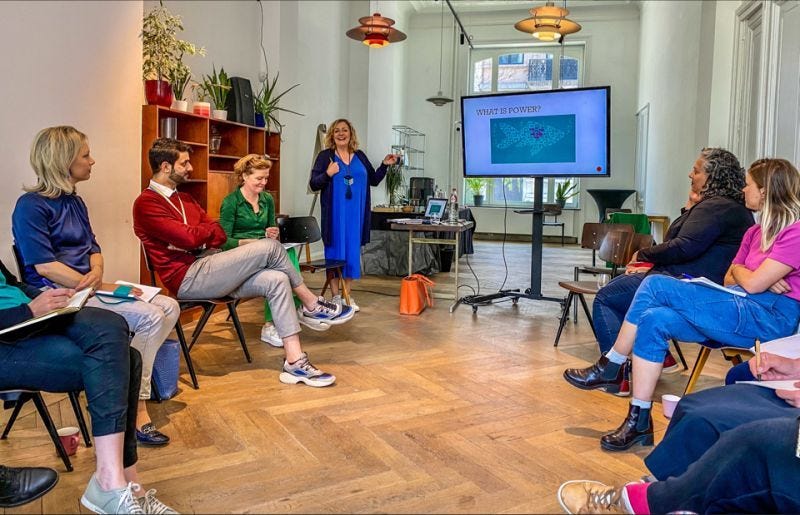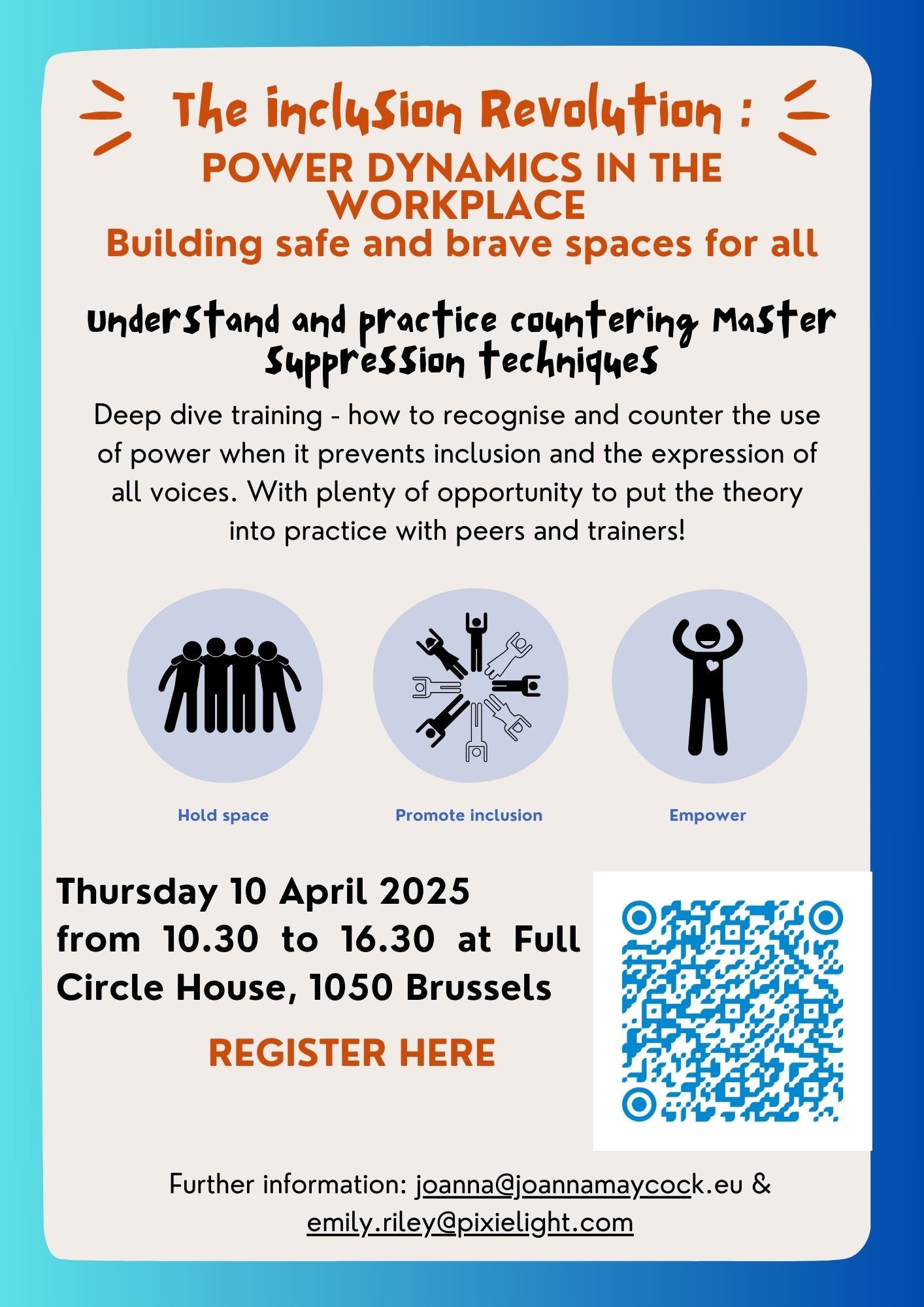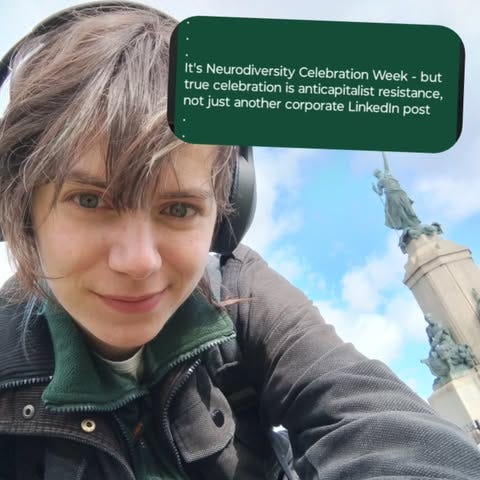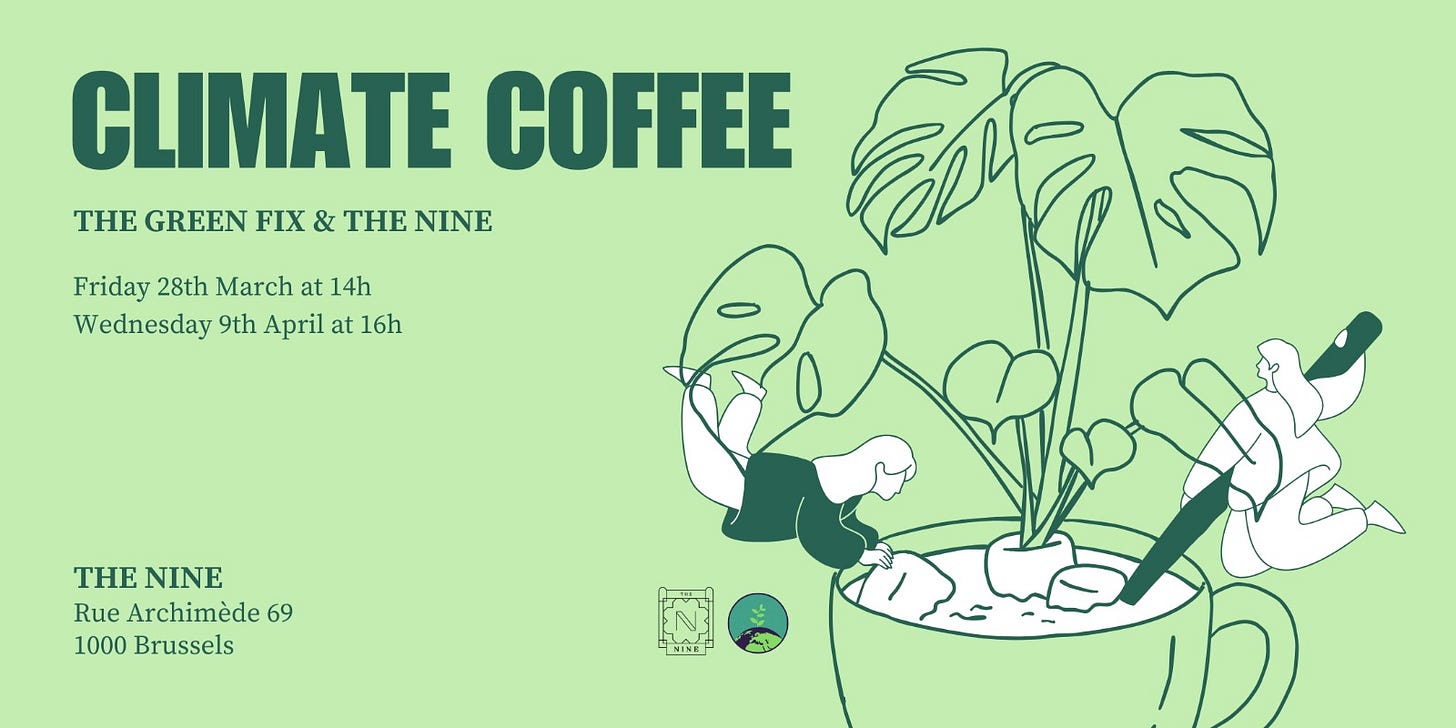I don't need to 'girlboss' my way through a capitalist patriarchy
On women and neurodivergence in the workplace, and not fitting in.
Guest piece by career coach Emily Riley and feminist facilitator Joanna Maycock, co-organisers of Inclusion Revolution, workshops that tackle sexism in the workplace.
As we come out of International Women’s Day and a month devoted to celebrating and advancing women’s rights and gender equality, we are driving an ‘Inclusion Revolution’ to enable everyone to gain the knowledge and techniques needed to break free from outdated patterns of ‘power over’.
“Brussels is a city of power and many of us came here for professional reasons, including me,” says Emily. “I worked in interest representation which is all about power: influencing policy decisions, building power in associations, and even personal power and contacts. I also experienced coming out of meetings feeling like not everyone was being heard in the same way.”
As a feminist organiser and campaigner, Joanna was really struck by these power suppression techniques and counter strategies when she came across them over a decade ago. “It was immediately helpful to see the practical application of these in day-to-day interactions trying to shift power in political spaces in Brussels to ensure feminist perspectives were not being shut down. We need to build and share these skills to radically transform power dynamics.” Joanna explains.
Together, they co-designed and started running the ‘Inclusion Revolution’. They are out to create more inclusive, intersectional and equal workplace environments, where everyone thrives, and ‘power with’ has become the norm. In their workshops, they focus on understanding and practicing counter techniques, to change work cultures. These techniques include:
Making Everyone’s Contributions Visible:
Too often, women's ideas are overlooked or credited to others, and the same applies to any underrepresented group. During the Obama administration, female staffers tackled this issue with an "amplification" strategy—repeating and crediting each other's ideas in meetings to ensure they were acknowledged. Organisations can encourage active recognition, ensure diverse voices are heard, and adopt transparent performance evaluations.
Calling Out Ridicule:
Ridicule narratives trivialise women's achievements and reinforce harmful stereotypes. Women in leadership frequently face scrutiny over characteristics that have nothing to do with competence. When Finland’s former Prime Minister Sanna Marin was elected as the world’s youngest leader, she challenged the assumption her age may hinder her professional capability. A culture shift toward assessing people based on their skills and expertise rather than outdated stereotypes can empower more women and minority groups.
Redefining Leadership Beyond the Double-Bind:
Women often walk a fine line between being perceived as too assertive or too passive. Tennis champion Serena Williams has spoken about the double standard in sports, where male athletes are praised for their passion while female athletes face criticism for similar behaviour. By embracing a range of leadership styles and valuing diverse approaches to decision-making, workplaces can break free from rigid expectations and create space for varied, authentic leadership.
Breaking Down Barriers to Information:
Professional advancement often depends on access to key networks and decision-making spaces. A 2024 report found that men are more likely to receive informal and on-site mentorship to boost their career, which points to the ‘old boys’ networks still thriving. Encouraging transparent and participatory decision-making and more open inclusive leadership contributes to platforming the voices of more groups.
Creating Systemic Change instead of Placing the Burden on Women:
Discussions about women in power often focus on women being responsible for adopting the ‘adequate’ behaviours to lead, as if they were to blame - but systemic issues require systemic solutions. Organisations that adopt policies to support women and underrepresented groups in leadership demonstrate a commitment to long-term equity rather than placing the burden on individuals. We must stop trying to “fix the women” and start fixing the systems of oppression.
By taking action to raise awareness about – and challenge - suppression techniques, we believe organisations can cultivate workplaces where skills and productive engagement are what truly matter. International Women's Day is not just a moment to reflect on the rights of women in the world—it's a call to identify barriers to equal power and embrace change to create a future where contributions, ideas, and leadership by all voices are celebrated every day.
Joanna Maycock and Emily Riley deliver a 1 day ‘Inclusion Revolution’ workshop on power dynamics tailored to organisations, NGOs or any group or collective. Click here for more information and register for the 10 April workshop (Brussels) here.
What’s Going On?
A climate justice news roundup that decentralises rich white men in the US.
Acts of kindness increased 10% in 2024, says the World Happiness Report.
Related: We’re all drawn to bad news - how do we handle it?How Bangladesh rolled out the world’s largest off-grid solar programme.
Related: For climate and livelihoods, Africa bets big on solar mini-grids.Student protests in Serbia: a crossroads for the EU.
Related: How to fight fascism from a position of strength.These Nigerian women TikTokers are challenging harmful gender norms. Here's how.
Related: TikTok workers take employer to court over union-busting firings.Greenpeace fined over $660m USD over peaceful pipeline protests.
Related: 5 ways Big Oil tries to shut down NGOs.
If you’d like to support The Green Fix, please consider tipping us a virtual coffee or upgrading to a gift paid membership.
UnFocused Section: there are so many cool events and things we want to share this month that we’ve skipped one Focus in order to chaotically compile the Things We Think Are Cool. (Should we do editions like this more often? Let us know in the comments!).
A note on Neurodiversity Celebration Week
Cass Hebron, Editor of The Green Fix, reflects on neurodiversity under capitalism.
It was Neurodiversity Celebration Week last week 💫 - but are we really celebrating neurodiversity beyond corporate LinkedIn posts?
I got an ADHD diagnosis last year. When I took the assessment, I saw so many 'symptoms' on the diagnostic criteria revolve around struggling to fit into traditional ways of working.
They ask you: Do you lose focus easily? (Who doesn’t in the age of information overload?) Do you switch constantly between tasks? (How else do I get everything done?) Have you switched careers or degree choice multiple times? (Well I was led to believe my life was doomed if I didn’t know my dream job by the age of 18).
And again, the internet is full of advice on how to 'cope' with neurodivergence. Instagram posts and help pages advise on me on how to adapt to a 9-5 office lifestyle - prep your meals the night before! Pomodoro! -, how to download an app to make sure I wake up at the perfect time for metro, boulot, dodo. It tells me that with the right tools I can thrive in the workplace - look how many CEOs have ADHD! If you think about it, it’s actually a superpower!
ADHD is not the reason that I struggle in capitalist systems. It is patriarchal and capitalist structures that struggle with us. And I do not look for treatment with the end goal of conforming to the status quo of rigid structures, inflexible thinking and productivity obsession. Neurodivergent author Charli Clement put this very well. “I am worth celebrating, understanding and supporting regardless of whether i have skills and talents you can mine”
While many women, and especially black and racialised women, are underdiagnosed with autism, ADHD and other forms of neurodivergence, it's also true that we are taught to assume our exhaustion under neoliberalism is a personal failing. It’s not surprising if you’ve found yourself googling the diagnostic criteria after a particularly stressful week looking for a reason you’re so damn tired that you find more ‘valid’ than simply being tired because this way of living is designed to exhaust us.
ADHD or not, it’s not your fault for not keeping up - even when we’re told that with the right time management tools and affirmations we can ‘hack’ the system. Hell, even the 9-5 work structure was designed for the male hormonal cycle that fluctuates over a day rather than a month.
If you want to celebrate neurodiversity, the best gift would be to resist these capitalist and patriarchal systems and seek collective liberation. Stop helping me adapt to the norms set by rich white men and help us build new norms for how we work, live and manage our lives. Don't just celebrate, advocate ✊
You’re invited! We have 3 events coming up in Brussels:
28 March and 9 April - Climate Coffee at The Nine
We’re hosting climate coffee breaks at women’s membership club The Nine in March and April. Drop by and say hi! Free entry, drinks available to buy. RSVP here.
22 April - Earth Day Clothing Swap
We’re partnering up with Fashion Revolution Belgium and the Commons Hub Brussels to celebrate Earth Day in style. RSVP free on Eventbrite.
Be part of the EUChangers program!
Sign up for an interactive and practical two-day training drawing from multiple cases on EU decision-making and influencing with Marc-Olivier Herman (EUChanger), Joost Mulder (Better Europe), Francesca Gater (ZOE Institute for Future-fit Economies) and insiders from the EU institutions.
Price: € 412,40 (excl. 21% VAT) - €499 (incl. 21% VAT). We are able to offer some pro bono spaces. If the fee is an issue for you and you are a young graduate with a keen interest in the EU and eager to work for the public interest, send us an email at euacademy@euchanger.org.
Book your sponsored slot by emailing wearethegreenfix@gmail.com.
So Now What Do I Do?
LEARN SOMETHING
Listen: What new spaces could climate action reach? An (anti)neoliberal chat with our Editor
for the podcast .Tune into this free webinar with
and Robert Macfarlane : How ecological creativity changes us and the world. 1 April.
DO SOMETHING
Working in a Brussels-based NGO? Here’s how you can join the strike on the 31st March (even if you’re not Belgian).
Activists 18-30 are invited to apply for a training course on the Right to a Healthy Environment, in May in Armenia. Deadline 6 April.
Tickets are live for the Alt Shift festival on degrowth this summer.
HELP A CAMPAIGN
Join the new campaign to demand an end to corporate corruption in EU politics.
The UN Environment Programme is inviting people under 30 to fill out a survey on their views on environmental protection. Fill out by 31st March.
The EU campaign for abortion rights for women still needs signatures! Sign here.
Stay in the loop
You can follow us on Instagram @thegreenfix_ . Bluesky @thegreenfix.blsky.social and LinkedIn. Connect with Cass on Instagram @cass.hebron, Bluesky @casshebron.bsky.social and LinkedIn.















